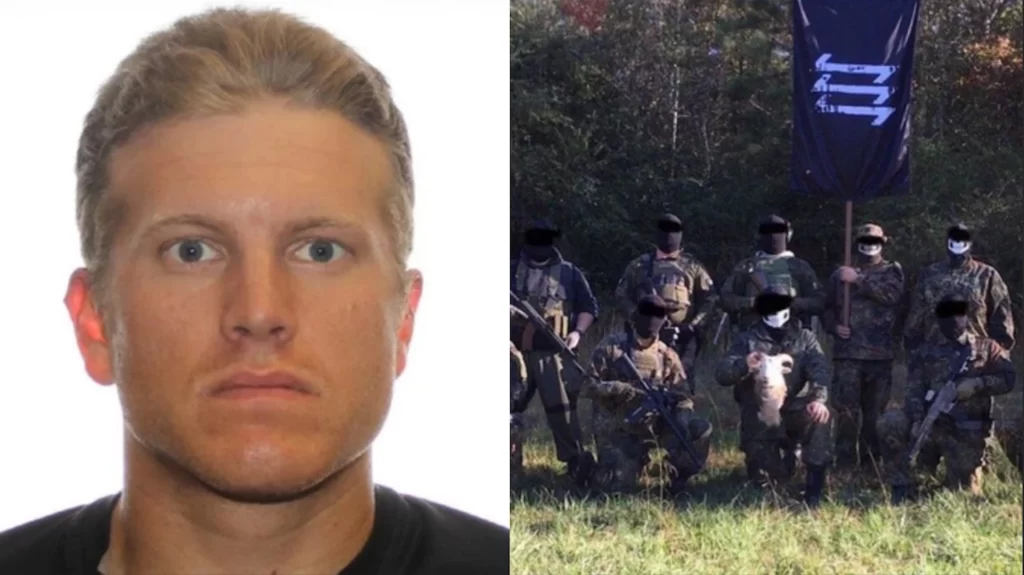
The foto has taken from VICE
STRATEGIC ASSESSMENT. The United Kingdom recently moved to proscribe the violent far-right extremist group The Base, a neo-Nazi organization with links to the United States, Canada, and Russia, as a domestic terrorist organization. The Base is currently believed to be led by Rinaldo Nazzaro, aka Norman Spear, a forty-six-year-old American allegedly living in Russia. The organization’s ideology advocates the use of violence to establish a fascist, white ethno-state by instigating a race war, and members are known to have participated in weapons and explosives training in preparation to mount anti-government campaigns. A number of individuals linked to the group have been prosecuted in the United States for crimes, including conspiracy to murder. In January 2020, the U.S. Department of Justice announced the arrest of several members of The Base, including Canadian Army reservist Patrik Mathews, for a plot to commit violence at a January 2020 rally in Richmond, Virginia. After debate in the UK parliament and subject to approval, which many expect, the proscription is slated to come into force by mid or late July.
In announcing the forthcoming proscription, UK Home Secretary Priti Patel railed against “evil white supremacist groups who target vulnerable people across the world.” Following voluminous racism tinged with violent far-right messaging, directed at the England soccer team in the aftermath of losing the UEFA European Championship to Italy earlier this week, this proscription is being held up as part of a national response to violent far-right extremism in the wake of widespread public criticism that the UK government had not done enough to counter it. Proscription of The Base will make it a criminal offense to be a member of, or provide support to, the group, and individuals found guilty of doing so will now face up to fourteen years in prison; the maximum sentence was increased following the Counter-Terrorism and Sentencing Act of 2021. The crackdown of violent far-right extremist groups in the UK is a welcome step. The government has previously been accused of having a double standard in how it viewed and dealt with terrorists, with some suggesting that violent far-right extremists were treated with kid gloves, assumed to be “football hooligans” and perceived as hapless and hopeless, rather than a part of any broader organized network creating political or security risks. Meanwhile, individual Islamist extremists were labeled as terrorists and taken more seriously as a threat to national security. The murder of Labor Party Member of Parliament Jo Cox by a National Action supporter in June 2016 forced many in the UK to reevaluate the threat posed by violent far-right extremists, who were growing more organized and savvy in their quest to recruit new members and spread their ideology, disseminating propaganda online that resonated with British far-right extremists. National Action subsequently became the first far-right group designated as domestic terrorists. Furthermore, the 2017 attack near Finsbury Mosque in London was also labeled a terrorist attack; perpetrator Darren Osborne—who was radicalized in less than a month via online anti-Muslim propaganda—was charged with terrorism-related murder and attempted murder and found guilty on both counts, and sentenced to life imprisonment.
Since then, the UK has been proactive in its designation of far-right extremist groups as terrorists if they meet the criteria, moving to counter them before they gain momentum and grow their ranks in significant numbers. Additionally, the labeling of relevant attacks as terrorism, and such groups as terrorists, sets an important normative standard that course corrects the earlier double standard. It is also important that terrorist designations not be misapplied, and that the definition and application of the term “terrorism” remain clearly circumscribed by the law. While still struggling with the ubiquitous threat posed by Salafi-jihadists, the UK is also facing an intensifying challenge from violent far-right extremists and growing concerns about youth engagement and mobilization. Earlier this year, a thirteen-year-old boy from Cornwall who founded the UK branch of Feuerkrieg Division (FKD), a Neo-nazi group that holds some of the white supremacist movement’s most extreme views, was sentenced, making him the youngest known person in the country to have committed a terrorist offense. In 2018, of the twelve individuals under the age of eighteen who were arrested for terrorism offenses, ten had links to far-right extremist ideologies, according to Metropolitan Police Assistant Commissioner Neil Basu. In a speech delivered yesterday, MI5 Director General Ken McCallum noted the threat posed to the UK by “misguided teenagers espousing a warped and racist ideology, bent on killing those different to them.” Between 2016 and 2020, the number of referrals to the UK’s counterextremism strategy PREVENT for far-right extremists in England and Wales doubled for individuals under twenty-years-old. Given the amount of time that young people have been spending online during the COVID-19 pandemic, the average age of people getting involved in extremist circles could keep decreasing over the next several years, with terrorists and other criminal actors likely to exploit such opportunities.
The Base will be the fifth far-right extremist group proscribed in the UK, joining National Action (NA), Sonnenkrieg Division (SKD), Feuerkrieg Division (FKD), and Atomwaffen Division (AWD). Several other groups are designated under a synonym or umbrella group or by affiliation, including Scottish Dawn, National Socialist Anti-Capitalist Action (NS131), System Resistance Network (SRN), and National Socialist Order (NSO). Canada has also proscribed AWD, NSO, and The Base, as well as The Proud Boys, the Russian Imperial Movement (RIM), Blood and Honour, and Combat 18. Australia has designated SKD, and to date, the U.S. has labeled RIM a Specially Designated Global Terrorist (SDGT) entity. The patchwork nature of designations and proscriptions across several member states of The Five Eyes (FVEY)—an international intelligence alliance—highlights the need for a comprehensive and consistent strategy to counter violent far-right extremism with international partners, even as these same countries have cooperated well to combat Salafi-jihadist groups like al-Qaeda and the so-called Islamic State, as well as their respective affiliates and franchise groups worldwide (TSC).





